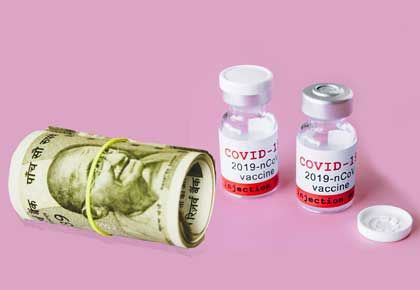Each of the larger states may need less than Rs 10,000 crore each to finance the exercise.
Sohini Das and Subhomoy Bhattacharjee reports.

The Centre has advised the state governments to explore using bank guarantees to finance the cost of buying Covid-19 vaccines.
Taking the cue, some states have broached the idea with the pharmaceutical companies manufacturing them.
These guarantees will offer the states the option to spread the cost of paying for the vaccines over more than one financial year.
At the same time, the companies will not be left with just empty promises from government bodies before they ship their doses to the districts where the vaccines will be stored.
Since it is the states which will decide the entire details of the logistics exercise for the jabs, the Centre feels it is expedient to let them negotiate the financial details with the companies.
The bank guarantee route is expected to work as follows: Each state is expected to sign a contract with one or two companies to offer the vaccines for a statewide roll-out.
The state government shall offer a bank guarantee to the companies signing the contract, along with a slim upfront payment.
It is expected that states will also write in clauses that the final sum payable shall be decided based on the number of shots that are actually administered to the population of the state.
Another clause could ask for the performance standards of the vaccines, including their levels of efficacy.
Both will buy time for the states to stagger their payments, instead of an upfront one.
Since these details would be impossible for the Centre to monitor, it is best that the states do the job of negotiating with the companies, a senior government official said.
Staggered payments also make it easy for the Centre to space out the support it shall need to offer the states over more than one year.
This has also become necessary as the budgets of the respective ministries have already been firmed up by the finance ministry for the next financial year.
The payment mechanism gives time to the Centre to factor them in later this year in one or more supplementary Budgets, not necessarily operated by the ministry of health.
There are no firm estimates as yet for how much India will need to set aside to run what could be the world's largest vaccination programme.
While Finance Minister Nirmala Sitharaman and senior officials of various central ministries have said money shall be no constraint for the programme, costs will matter.
It will determine how quickly the nation is able to finance the roll-out of the vaccination programme.
It will have a massive bearing on how fast the economy is able to shake off the risks of infection and get back to work.
At least two companies, which are offering their product to the Indian government, confirmed the development.
An official with one of them, which is in the last leg of developing and getting approval for its Covid vaccine, said bank guarantees for making payments for the vaccines had been discussed with some of the government agencies.
"Only if there is an advance from the government, then bank guarantee route is fine. Nothing has been concluded," the person said.
A representative of another company also concurred about the shape of the negotiations but said it was too early to finalise the details.
"Health is a state subject and so the onus of procurement would be on states.
States are likely to negotiate the prices once the vaccine candidates start getting nod," the representative said.
Private sector firms have had difficult experience with many states over unmet dues in several sectors.
Promises by the states to stand good on their payment obligations are therefore often met with scepticism as in the power and insurance sectors.
A bank guarantee even with riders will go a long way to reduce the scepticism.
However, states shall need to convince their banker and the RBI for offering such guarantees.
There are no precedents for states across India to offer such large scale payment support.
The central government official said unlike the payment mechanism worked out for the Uday scheme in the power sector, given the limited lead time, it was not possible for any states to write in similar fiscal rules to sequester some money from their budget to meet their payment obligations to the companies.
Hence, the need to offer bank guarantees, the official said.
However, given the rise in herd immunity among the Indian population, it is expected that the eventual number of people who shall need the jab will not be more than 500 million, at most.
With such numbers, each of the larger states may need less than Rs 10,000 crore each to finance the exercise.
Another official noted that pricing and related exercises shall begin once the vaccines are licensed for commercial sales.
"We are waiting for the regulator to approve a vaccine. We are engaging with all vaccine makers and none of them has quoted a final price yet."
*Kindly note the image has only been posted for representational purposes.
Feature Presentation: Ashish Narsale/ Rediff.com












